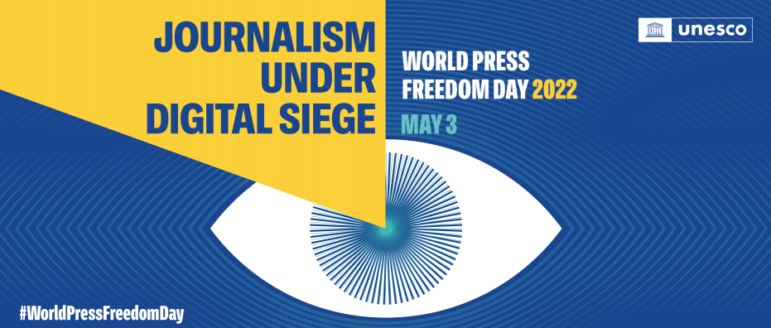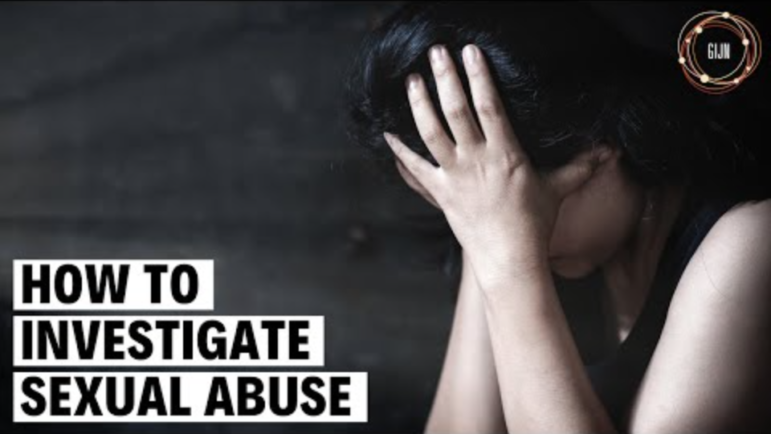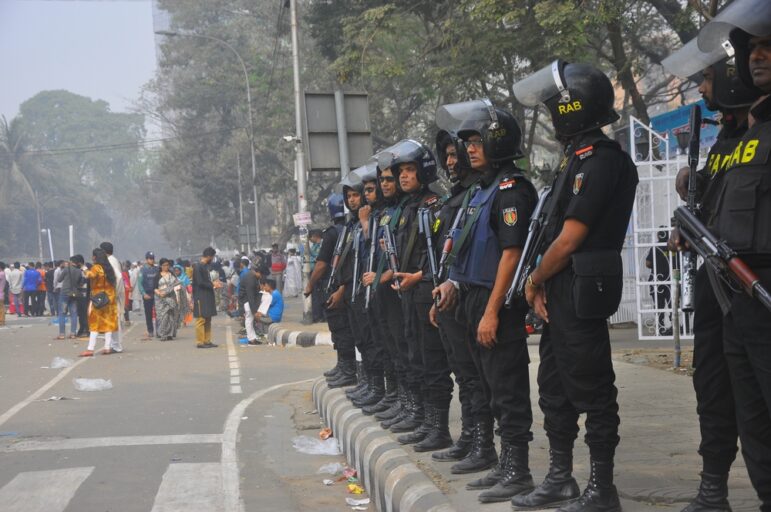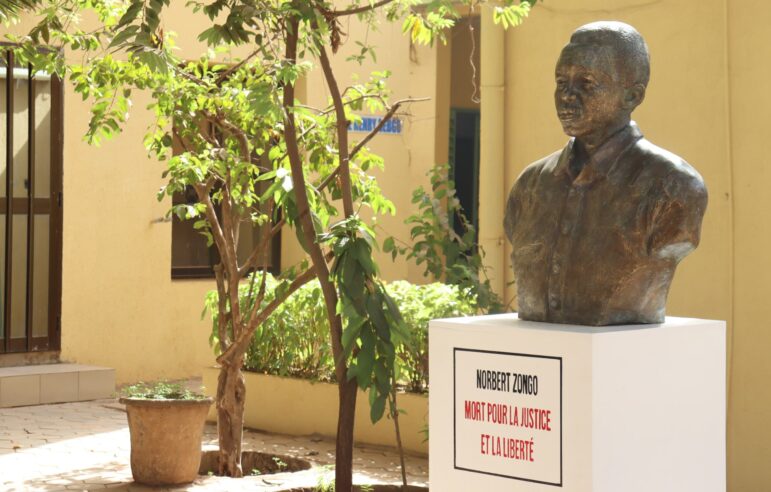

Image: Screenshot
On World Press Freedom Day, Journalism Increasingly Faces Digital and Physical Threats
Read this article in
Like democracy itself, press freedom is at its lowest point this century – while attacks and surveillance on journalists are at their highest – as the world marks World Press Freedom Day on Tuesday, May 3.
The event, sponsored by UNESCO and other groups with events worldwide, comes amid growing headwinds for the media of declining revenue, widespread disinformation, increasing legal harassment, and rising autocracy. Yet, from Ukraine to Serbia to Mexico, independent newsrooms and freelancers continue to bravely dig up and report the facts, and hold bad actors to account.
Fueling this stubborn defiance is a growing alliance between journalists and human rights defenders, who are helping each other more than ever before. The ties can be seen from collaborations among rival newsrooms to exiled reporters getting smuggled video clips to veteran war reporters in Syria advising colleagues in Ukraine.
That perseverance was a common takeaway from a webinar to mark 2022’s World Press Freedom Day, titled “Reporting in Dangerous Times.” Presented by the International Center for Journalists (ICFJ), a GIJN member organization, the panel featured journalists who cover four of the world’s most dangerous regions.
This kind of selfless courage is being echoed by other World Press Freedom Day events, such as the awarding of the UNESCO/Guillermo Cano World Press Freedom Prize to the Belarusian Association of Journalists (BAJ). Named in honor of Guillermo Cano Isaza, a Colombian journalist murdered for his reporting in 1986, this year’s award recognized how BAJ continues to report and promote free expression in the region, despite being banned by autocratic officials and having its offices raided.
Free speech is in such peril these days, however, that even journalism awards are vulnerable. In late April, Hong Kong’s venerable Foreign Correspondents’ Club decided to suspend its human rights press awards. The reason: fear that merely highlighting individual stories might violate Hong Kong’s new, repressive national security law.
Insights from the World’s Least Free Regions
The four panelists participating in the webinar – who have deep experience in Latin America, Russia, Afghanistan, and the Horn of Africa – agreed that collaboration and nonprofit free press initiatives are making a positive difference. Also helping are new tools like virtual private networks (VPNs) and free censorship circumvention apps, as well as old-fashioned, low- tech distribution methods, like shortwave radio.
However, the assembled journalists still painted a grim picture of the forces arrayed against independent media.
“From the battlefields of Ukraine to the Mexico border to jail cells in China, Turkey, and Eritrea – and a multitude of countries where governments are doing everything they can to censor independent news – the situation is not good right now,” acknowledged moderator Patrick Butler, senior vice president for content at ICFJ.
Sirwan Kajjo, an extremism and press freedom reporter at Voice of America (VoA), said extreme censorship in Russia and open conflict in Ukraine – as well as new government censorship in the latter — had upended the media climate in both countries since Russia’s unprovoked invasion.
“At least nine journalists have been killed either from direct fire, or being in the wrong place at the wrong time,” Kajjo pointed out. “Inside Russia, laws have been passed that prevented the few remaining independent media from reporting objectively on the war.”
“On the Ukraine side,” Kajjo went on, “there are so many issues journalists face. Many have been separated from their families for months, and many continue to work around the clock. Nobody expected that Russia would actually invade – newsrooms were not 100% prepared, and certainly not for the massive scale of the attack.”
The Rise of Exile Journalism
Kajjo did add a silver lining to his bleak analysis of Russia and Ukraine. “Exiled journalists are already doing an excellent job to fill that information void,” he said.
Sami Mahdi, founder of the PAYK Investigative Journalism Center in Afghanistan, said close bonds have likewise been preserved between exiled reporters and those who remain in Afghanistan, allowing investigative journalism to survive. Mahdi was forced to flee his native country as the Taliban seized Kabul last summer.
“The most recent figures show that, since the takeover on August 15, 2021, over 6,000 journalists have lost their jobs in the country, 40% of media outlets have closed down, 85% of female journalists lost their jobs – over 80 reporters have been imprisoned and tortured by the Taliban,” Mahdi explained. “Self-censorship is growing now, because gunmen come to newsrooms with their weapons, and ask editors to edit reports according to Taliban policies.”
Still, the situation in Afghanistan is perilous. Mahdi said local Afghan reporters have been forced to claim that journalists in exile were responsible for critical reporting. “But that tactic won’t work for long,” he noted. And while the Taliban have been slower than some dictatorships to block news sites, he warned that there are ominous signs of an imminent digital crackdown. “The Taliban has just issued a decree banning TikTok in Afghanistan,” he said, which would close down one of the few remaining platforms used to spread unfiltered news and information. “People thought they didn’t have the technical knowledge, but that is changing.”
Authoritarian Media Control and Violence
Shockingly, there are even more threatened environments for journalists, and the worst of them all, according to last year’s World Press Freedom Index, is Eritrea in East Africa.
“The Horn of Africa is one part of the world where press freedom has taken a big step backward in recent years,” observed panelist Salem Solomon, a VOA Central News editor originally from Eritrea. “Right before the Russian invasion of Ukraine, the biggest conflict going on was Eritrea and Ethiopia, whose government also prevents the media from covering the ongoing war and human rights issues,” Salem said. “In 2021 alone, 46 journalists were detained in Ethiopia, making Ethiopia one of the worst jailers of journalists in Africa.”
Broad government control over the internet in the Horn of Africa has also led to higher levels of hostility and harassment of journalists, including those in exile. “The internet is essentially owned by these governments, and solely owned, and has a dominant control over the flow of information,” she said. “In Ethiopia, there is currently basically an information blackout.”
Governments have paired this media omnipotence with other restrictive laws aimed at freedom of expression. “There is an anti-terror law used to prosecute journalists who cover rebel groups – basically, if you interview a rebel, you’re [accused of] aiding and abetting a terror group,” she said.
The press in several countries in Latin America faces similarly threats. Mexico now ranks as the most dangerous country to be a reporter, with eight journalists killed there in just the first four months this year. “Haiti and Colombia are also hotspots, but Nicaragua is of particular concern right now, with press freedom on the downslide since December 2018,” said Aliza Appelbaum, ICFJ’s senior program director for Latin America. “A lot of its independent journalists have had to go into exile, and, to their credit, a lot have continued publishing. But Nicaragua relies a lot on radio for information, so you can only do so much from outside.”
Appelbaum said autocrats were increasingly exploiting a human phenomenon in which people tend to reject fact-based reporting if it conflicts with their preconceived notions or previous claims, no matter how strongly the evidence refutes them. “It’s really difficult for people to admit they believed something wrong,” she said. “So dictators realized they just need to be the first to make a claim, not that they’re right, because people tend to hold on to their initial agreement with the claim.”
Kajjo said new technologies like mirroring site services were effective for audience access in repressive societies, but Salem stressed that older channels should not be forgotten. “The importance of shortwave radio is very prominent now in Africa, which has low internet penetration,” she said. “That’s how you reach remote places.”
When each panelist was asked for signs of encouragement in this ominous press freedom landscape, their responses largely kept to the same theme: Keep doing the work; don’t give up. Mahdi summed up the sentiment like this: “I see journalists continuing to report.”
Additional Resources
On World Press Freedom Day 2021, Recognizing “Information as a Public Good”
The Economic Costs of Curbing Press Freedom
10 Ways to Track Press Freedom during the Pandemic

Rowan Philp is a reporter for GIJN. He was formerly chief reporter for South Africa’s Sunday Times. As a foreign correspondent, he has reported on news, politics, corruption, and conflict from more than two dozen countries around the world.









